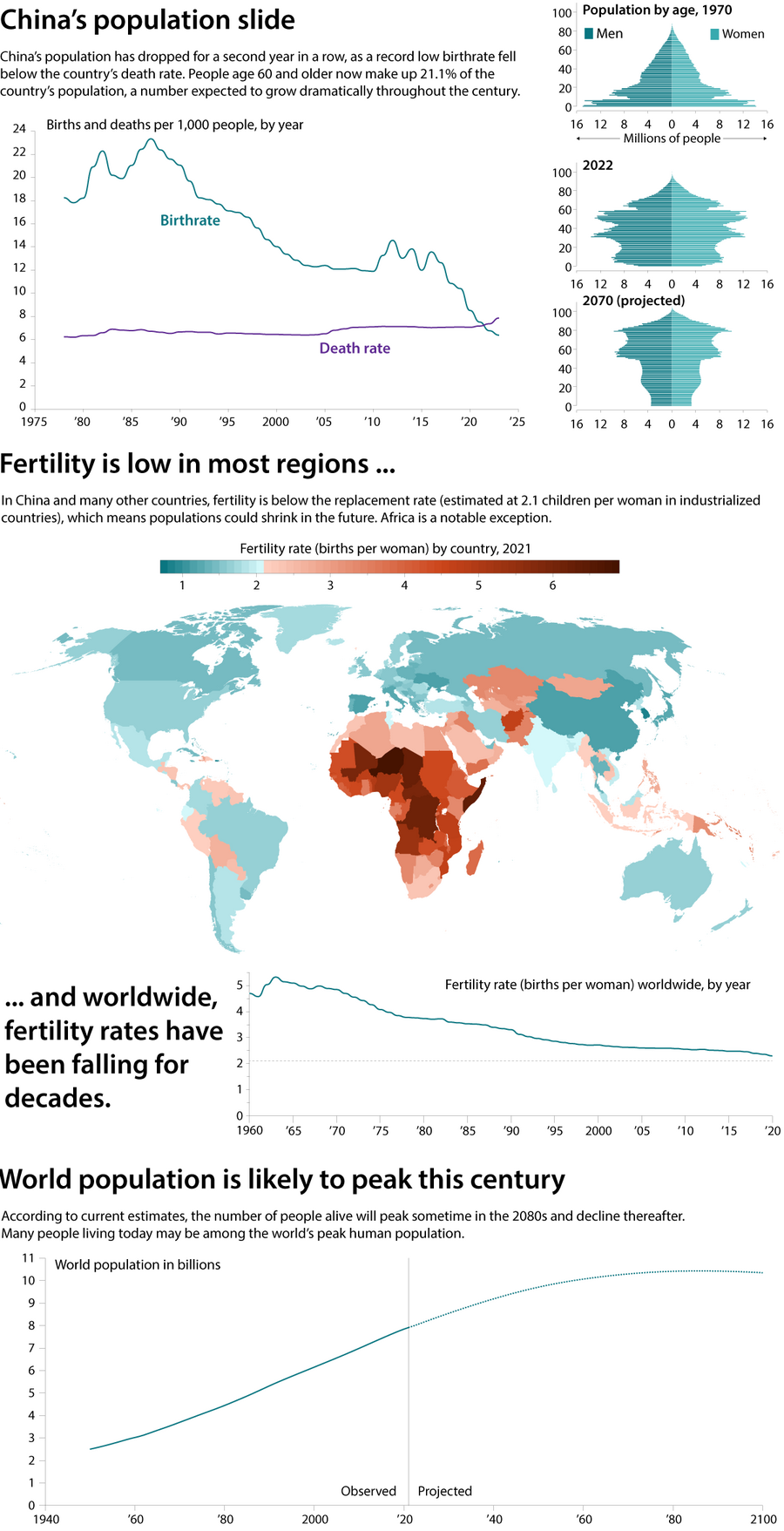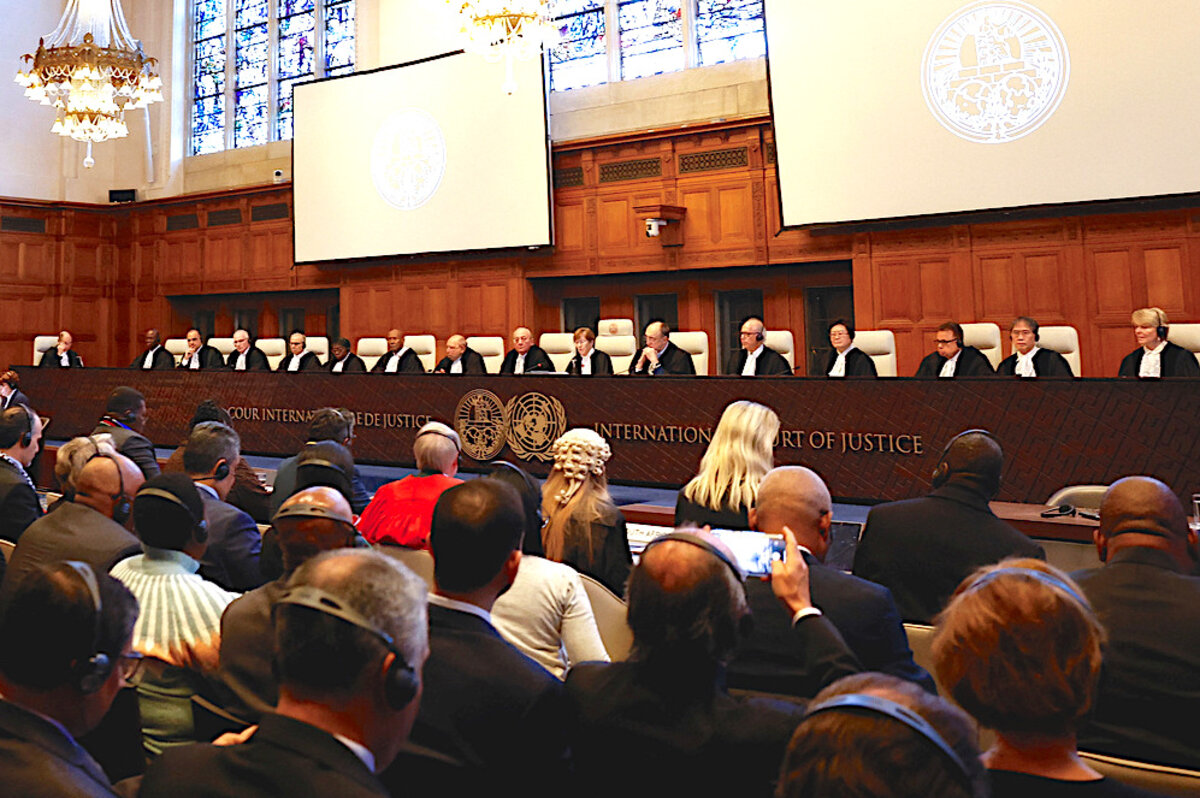The U.S. pledged to retaliate after a lethal attack on American soldiers in Jordan. The Biden administration’s next steps are pivotal in shaping how far the U.S. is drawn into the escalating Middle East conflict.

Why is Christian Science in our name?
Our name is about honesty. The Monitor is owned by The Christian Science Church, and we’ve always been transparent about that.
The Church publishes the Monitor because it sees good journalism as vital to progress in the world. Since 1908, we’ve aimed “to injure no man, but to bless all mankind,” as our founder, Mary Baker Eddy, put it.
Here, you’ll find award-winning journalism not driven by commercial influences – a news organization that takes seriously its mission to uplift the world by seeking solutions and finding reasons for credible hope.
Explore values journalism About usMonitor Daily Podcast
- Follow us:
- Apple Podcasts
- Spotify
- RSS Feed
- Download
 Amelia Newcomb
Amelia Newcomb
Adaptation is the stuff of human history – and our current moment is no exception. It undergirds the Monitor’s recent series The Climate Generation. It’s present in our graphic today on falling global birthrates. It even extends into a new TV series based on the beloved young adult book series “Percy Jackson and the Olympians,” which Cameron Pugh writes about today.
People understandably resist calls to adapt. But done well, adaptation can ensure that important values live on. Cameron points to one well-known author’s work. “Part of the enduring power of Shakespeare is that we’ve managed to adapt his work into modern stories,” he says. “The way they’re expressing it has changed, but the theme hasn’t.”
Already a subscriber? Log in
Help fund Monitor journalism for $11/ month
Monitor journalism changes lives because we open that too-small box that most people think they live in. We believe news can and should expand a sense of identity and possibility beyond narrow conventional expectations.
Our work isn't possible without your support.
Today’s stories
And why we wrote them
( 5 min. read )
Today’s news briefs
• North Korea missile test: North Korea tests its new submarine-launched cruise missiles, firing an upgraded missile for the second time in a week and accelerating its navy’s nuclear armament, state media reported.
• Hong Kong decision: A Hong Kong judge orders the liquidation of property giant China Evergrande Group, dealing a fresh blow to confidence in the country’s fragile property market as policymakers step up efforts to contain a deepening crisis.
• U.S. equal pay law: The Biden administration marks the 15th anniversary of the landmark Lilly Ledbetter Fair Pay Act with new action to help close gaps in pay for federal employees and employees of federal contractors.
• Super Bowl set: Patrick Mahomes, Travis Kelce, and the Kansas City Chiefs are heading to Las Vegas with a rare chance to repeat as champions. They face the San Francisco 49ers in a rematch of the 2020 Super Bowl.
( 5 min. read )
From the outset, Israel’s twin war goals in Gaza of rescuing hostages and defeating Hamas have been hard to reconcile. As the United States and others try to mediate a new cease-fire/hostage deal with Hamas, do Israelis know what victory looks like?
Graphic
( 3 min. read )
Widespread fears of global overpopulation have now turned into concern about a population slump. Is China’s plunging birthrate a sign of things to come elsewhere?
( 4 min. read )
It’s common for presidential candidates to promise big. In Argentina, where the economy is in crisis, newly installed President Javier Milei is working to square his at-times extreme ideas with a challenging political reality.
( 5 min. read )
“The Lightning Thief” has spent 13 years on the bestseller lists. So it’s no surprise Hollywood came calling. After two botched movies, what might be surprising is that fans were willing to give a new series another chance.
The Monitor's View
( 3 min. read )
In the days since the International Court of Justice issued a preliminary ruling on the conduct of Israel’s military operations in Gaza, every party with a stake in the conflict has found some confirmation of its point of view.
South Africa felt “vindicated” in its decision to file a charge of genocide against Israel in the world’s top court. Palestinians felt that their rights as people – and as a people – were acknowledged. In the court’s refusal to demand an immediate cease-fire, Israel saw confirmation of its right to defend itself from further attacks by Hamas.
The court, which issued its opinion last Friday, did not rule on the key question of whether Israel had any intent of genocide. Rather, it simply ordered Israel to uphold the core provisions of international law regarding war – namely, to protect civilians and enable the provision of humanitarian assistance – out of a legal obligation to prevent genocide. The ruling to impose such “provisional measures” means the court found that the charges against Israel “appear to be capable of falling within” the 1948 Genocide Convention and thus do deserve further legal scrutiny.
That in itself is a fairly low bar, legal experts point out. The case will likely take years to resolve. But the court was careful to strike a balance. It called for the immediate release of the remaining hostages held by Hamas, the governing Palestinian group in Gaza whose militants attacked Israel last October, even though South Africa did not ask the court to take action against Hamas.
The ability of each side to find a silver lining reflects what Todd Buchwald, former ambassador for the U.S. Department of State’s Office of Global Criminal Justice, called the wisdom of restraint. Indeed, the court’s decision sends a timely message that the real power of international law rests more on the principle of respect for individual dignity than on broad condemnation.
The ruling challenges all nations to “take international law seriously at a time of increasing violence and conflict and decreasing respect for the authority of international legal institutions,” wrote David Kaye, a law professor at the University of California, Irvine, in Foreign Affairs.
It also illustrates how any people caught in a violent crisis can have access to a court. In Sudan, for example, where a civil war has displaced more than half a million people, citizens there pointed to the ruling as confirmation of one possible avenue of justice for them.
The case also turned a lens on South Africa, which had broad support from across the Global South in lodging its case against Israel. More than a few of its citizens say high levels of corruption at home undermine their government’s credibility in questioning Israel’s response to Hamas.
The most consequential shift, however, may be taking place within Israel. Demands for elections have grown as the conflict drags on and more than a hundred Israeli hostages have not been brought home. Interest in reconciliation is growing, particularly among young Jewish and Arab Israelis. “There was a level of urgency I had not sensed before,” wrote Maya Savir, an Israeli activist who studied post-conflict healing in Rwanda and South Africa and now leads workshops across her own country, in New Lines Magazine.
In trying to achieve a measure of balance in its ruling, the court sent a signal for calm reflection on what level of justice and mercy might be needed for Israelis and Palestinians. Sometimes not condemning opens a window for both truth and reconciliation.
A Christian Science Perspective
Each weekday, the Monitor includes one clearly labeled religious article offering spiritual insight on contemporary issues, including the news. The publication – in its various forms – is produced for anyone who cares about the progress of the human endeavor around the world and seeks news reported with compassion, intelligence, and an essentially constructive lens. For many, that caring has religious roots. For many, it does not. The Monitor has always embraced both audiences. The Monitor is owned by a church – The First Church of Christ, Scientist, in Boston – whose founder was concerned with both the state of the world and the quality of available news.
( 4 min. read )
Through prayer, we can see how we are created by God to collaborate productively, like an orchestra in concert.
Viewfinder

A look ahead
Thanks for starting your week with us. Tomorrow, correspondent Howard LaFranchi will look at what the faltering U.S. support for Ukraine’s war effort means for Ukraine, Europe, and U.S. dealings around the world.










